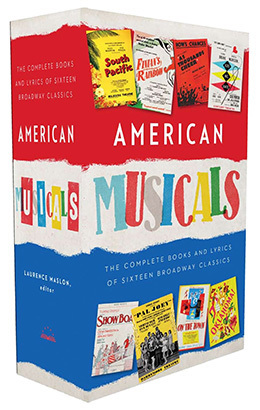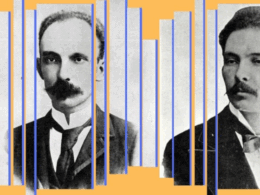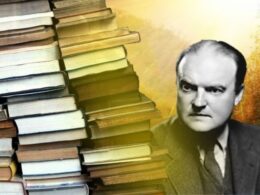Last month Library of America had the virtual equivalent of a full house for its LOA Live event It’s a New World, Golde: Classic American Musicals in the 21st Century, a panel discussion about the present and future of a beloved American art form, featuring NYU arts professor Laurence Maslon, the editor of Library of America’s two-volume American Musicals anthology; librettist and director Tazewell Thompson; and Ted Chapin, president of the Rodgers and Hammerstein Organization. The complete talk is now available for streaming on LOA’s YouTube channel and on our LOA Live Events page on this site.
Because the panelists could answer only a handful of viewers’ questions during the live Q & A, Laurence Maslon generously agreed to address some of their unanswered questions in writing after the program. We present his responses below; attendees are identified by their first names and their questions have been edited for concision and clarity.

Rosemary: I thought the recent Oklahoma! was Oklahoma! as told by Judd Fry. Would you comment on my view?
Laurence Maslon: Judd was certainly viewed most sympathetically by the director; I don’t see it as “his” show—but a lot of it was focused on his dilemma as the “other.”
David: From other reading, I’ve seen that one reason that shows run so long today is that with the cost of tickets on Broadway, audience members want to be sure that they will enjoy the show. Even touring shows are getting out of reach for casual fans.
Maslon: Yes, prices are high. That’s why often audiences want a “sure thing”—but there was nothing “sure thing” about Hamilton or Dear Evan Hansen. So it cuts both ways.
Helen: Can you elaborate more on the difference in The Sound of Music from stage to screen that you referenced?
Maslon: Location shots, moving songs in different places, adding “Something Good” and “I Have Confidence”—lots of structural and cinematic choices which opened up the stage property.
Michael: The Kurt Weill musicals are genius. Why don’t you think they receive the same interest in revivals as, let’s say, the Rodgers and Hammerstein shows?
Maslon: The books for many of them—Knickerbocker Holiday, One Touch of Venus, Firebrand of Florence—are very dated and don’t display much psychological sophistication.
Cindy: How do you restage a musical that includes dated material which is clearly sexist or racist given today’s consciousness? Do you delete the part that is dated? Or is it important for audiences to face up to the past even if it makes them cringe?
Maslon: Context is everything. You can trim minor things, like lines or characters that don’t work. But if a work is major and can be contextualized theatrically, it should work on its own terms.
Robert: In a recent revival of Carousel, set in coastal Maine in the 1890s, Julie Jordan was played as the fair, white innocent, as usual, but Billy Bigelow was played by a very talented Black actor, with dreadlocks, which makes the storyline incredible. It was great to have the talented Black actor in the part, but wouldn’t it be far less distracting to set it contemporary times?
Maslon: Well, Carousel is definitely set in the late 1800s; it would be odd to update—so much would be different today. I think the producers of the revival were asking audiences to see “colorblind” casting.
Peg: Thoughts on ethnicity and Hamilton?
Maslon: Hamilton really made audiences see the characters in a fresh way, without any preconceptions. A great theatrical stroke. But one wonders what it will be like staged in high schools and community theaters that happen to have all–white actors! It certainly generated a lot of new stars of color in the industry.
Mark: How did creators of a blockbluster like Oklahoma!, My Fair Lady, West Side Story, deal with expectations and pressures of coming up with their next show? I am thinking of Lin–Manuel Miranda having to follow up Hamilton.
Maslon: Well, it varies; R&H did Oklahoma!, then Carousel, so that’s pretty good for a follow-up. But then they did Allegro, which was not a hit. It’s different for everyone. Remember, Hamilton was Miranda’s second musical after the Tony–winning In The Heights.
Joan: Given this political moment, has there been interest in South Pacific and its exploration of race?
Maslon: I think the Lincoln Center Theater production in the 2000s, which also toured, will be the definitive production for a while.
 |
| American Musicals: The Complete Books and Lyrics of 16 Broadway Classics (Two volumes) |
David: Show Boat: Wasn’t the point to show how Black people were treated at that time in history?
Maslon: I don’t think Show Boat was meant to be a documentary of race relations; some of those relationships were turned into entertainment pieces that can be hard to watch today. Queenie was played by a white actress in blackface in 1927.
Steven: Doesn’t “In Dahomey” expose Hammerstein’s real opinion about the Black characters and the stereotyped behaviors they are required to depict?
Maslon: “Expose” seems strong to me. But indeed Show Boat plays into a lot of stereotyped behavior in its relationships and the kind of performances it channels; as noted above, Queenie was played by a white woman in blackface in 1927. Yet, I don’t think “In Dahomey” was kept in any subsequent revivals.
Steven: Robeson’s lyrics for “Old Man River”: rather than “You get a little drunk and you land in jail,” he sang “You show a little grit.” My understanding is that he cleared this with Hammerstein.
Maslon: Robeson changed it many times in many ways over the years. Hammerstein was alternately peeved and supportive, but he had great respect for Robeson.
Susan: I’m a Professor Emerita of music. For many reasons in a course I used to show—with explanations—The Jazz Singer. No one complained because of my sensitive set-up, based on the history of entertainment. Until recently, when the librarian said he would not allow this to be shown. What do we do with historical artifacts like this?
Maslon: I think you do exactly what you did: set it up in a sensitive way. I teach The Jazz Singer as well, but only show scenes without Blackface (“Blue Skies”); it’s not a film one really needs to see from start-to-finish. (Also, a campus librarian shouldn’t be censoring material…)
Thomas: When one thinks about wider international acceptance and diffusion of American music genres since the ’50s it seems clear that jazz, blues, rock, and rap have all gained worldwide audiences. It’s not as clear to me that Golden Age American musicals have achieved the same level of international recognition. I wonder why?
Maslon: Well, in the day, which was 1920 to 1970, show music was considered to be the highest form of American popular music. Not a bad run. (My book Broadway to Main Street is all about this phenomenon.)
Kat: Should we retire Kiss Me, Kate?
Maslon: Interesting. It depends on how it’s handled. The book was written by a woman, Bella Spewack. I think it was adjusted in its recent outing with Kelli O’Hara. “Retire” seems harsh to me—the personalities are BIG in that show; Lili Vanessi can take care of herself.
Anonymous: You spoke about Porgy and Bess and the fact that it’s about Black people living in a white world, and that it was great representation at the time. How do you feel about white people having written it, and do you think you’d feel differently if a white person wrote a show for performers of color today?
Maslon: In my opinion, who writes for which voices is one of central cultural conundrums of our time. I don’t have a clear answer, as it depends, it seems to me, on the nature of the project and the sensitivity of the writer. Shakespeare wrote the character of Othello, which, to my knowledge, no Black actor has ever turned down a chance to play. On the other hand, Lorraine Hansberry wrote a challenging play called The Sign on Sidney Brustein’s Window which is all about the white people she knew (and married); only one minor Black character in it. Didn’t she have a right to do so?
Elizabeth: Next year I will be staging a production of Something Rotten, which obviously is a more contemporary musical despite its setting in the Renaissance. Our approach is to use the themes and revamp them to fit the times of coronavirus and a new “renaissance of art” in modern times. I was just wondering how you feel about revivals/re-stagings of relatively contemporary shows that aren’t necessarily out of touch or outdated yet, just not particularly fitting to a very particular time period.
Maslon: My feeling is that Something Rotten has nothing to do with Elizabethan England and everything to do with Saturday Night Live; it has a freewheeling chronological spirit. As you long as you don’t violate your licensing agreement, go for it.
Michael: If someone were to object to the recent Broadway production of Oklahoma! because they honestly feel much of it was counter to what the creators, especially Hammerstein, intended to say with the show, would you say that’s a valid objection and opinion?
Maslon: It’s a complicated production. It changed very few of Hammerstein’s words (although the director cut my favorite joke). So you could argue a lot of the point of view was already in the actual material, although obviously focused in a personal way by the director. It certainly factors in what we know (and feel) about Manifest Destiny and frontier justice in the twenty-first century. Certain things didn’t work for me, personally, but I felt the characters were respected—especially Aunt Eller’s role in that community. (Changing the intermission made me crazy, however. . .)
Ray: You make the point that we wouldn’t change the script for Hamlet or A Doll’s House. Why not? We’re doing it with some of our musicals.
Maslon: Shakespeare and Ibsen have stood the test of time. If a director were to rewrite them, he or she would be altering their intent and somehow suggesting that the director was smarter than the writer. My feelings are the same about musicals—if you can’t justify doing a musical as written, leave it alone and move on.
James: Would it be possible to depict elements of the minstrel show (specifically as employed by Irving Berlin) in historical accurate form in a modern production?
Maslon: Again, it needs context. Scottsboro Boys and the revival of Shuffle Along both tried it (the latter more successfully, as the creative staff was Black). Shuffle Along‘s cast embraced the historical truth of the convention.
Ann: Do you think it’s possible anymore to write a musical that has no political message and is purely celebratory?
Maslon: Oh sure: The Producers, Something Rotten, School of Rock, Tootsie, Beetlejuice.
Troy (from Toronto): I am a student who has just started graduate musical theater writing at NYU (Tisch). I am an African–Canadian based in Toronto this semester and am wondering if Broadway producers will look to younger or upcoming writers / composers to rework the concept from a different lens. Will American audiences be open to stories from Black creators who are NOT American?
Maslon: Come from Away showed us that Broadway (and the world) was hospitable to Canadian writers, and we’re seeing more Black writers make a difference (Kristin Childs, Michael B. Jackson). Maybe you’ll be the first!
Sandra: When I saw the 1999 version of Annie Get Your Gun I was surprised at how racist it was. Are there shows that shouldn’t be revived where others can be/maybe with revision?

Maslon: Annie Get Your Gun does have some really offensive things baked into it. But they aren’t essential to the show, so maybe they could be revised without jeopardizing the larger entertainment value of the property. We can’t un-know what we know, so even a Berlin show like Mr. President is impossible to revive because its view of politics is too naive for today’s audience.



